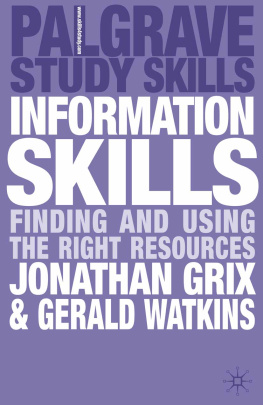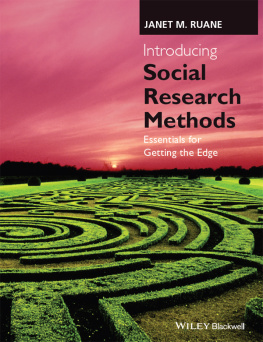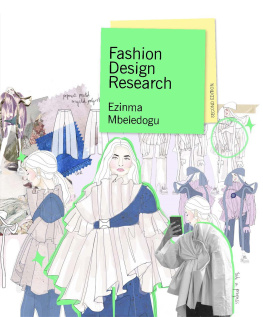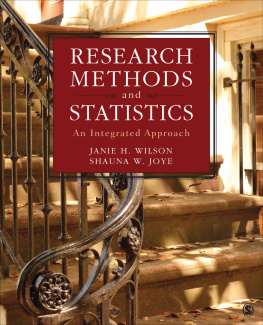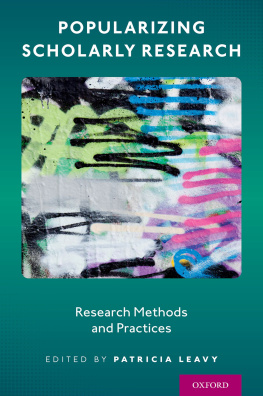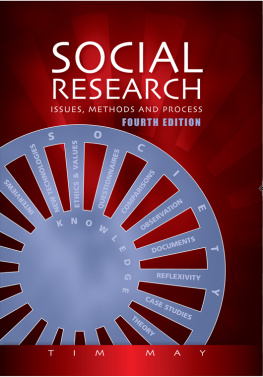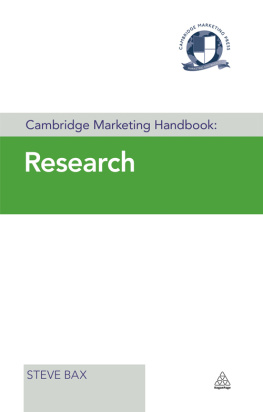The Foundations of Research
Research Skills
Authoring a PhD
The Foundations of Research (3rd edn)
Getting to Grips with Doctoral Research Getting Published
The Good Supervisor (2nd edn)
PhD by Published Work
The PhD Viva
Planning Your Postgraduate Research
The Lean PhD
The PhD Writing Handbook
The Postgraduate Research Handbook (2nd edn) The Professional Doctorate
Structuring Your Research Thesis
Teaching and Learning
Series Editor: Sally Brown
Access to Higher Education
Coaching and Mentoring in Higher Education
Facilitating Work-Based Learning
Facilitating Workshops
For the Love of Learning
Fostering Self-Efficacy in Higher Education Students
Internationalization and Diversity in Higher Education
Leading Dynamic Seminars
Learning, Teaching and Assessment in Higher Education
Learning with the Labyrinth
Live Online Learning
Masters Level Teaching, Learning and Assessment
Reimagining Spaces for Learning in Higher Education
Successful University Teaching in Times of Diversity
The Foundations of Research
Third Edition
Jonathan Grix

Jonathan Grix, under exclusive licence to Springer Nature Limited 2004, 2010, 2019
All rights reserved. No reproduction, copy or transmission of this publication may be made without written permission.
No portion of this publication may be reproduced, copied or transmitted save with written permission or in accordance with the provisions of the Copyright, Designs and Patents Act 1988, or under the terms of any licence permitting limited copying issued by the Copyright Licensing Agency, Saffron House, 610 Kirby Street, London EC1N 8TS.
Any person who does any unauthorized act in relation to this publication may be liable to criminal prosecution and civil claims for damages.
The author has asserted his right to be identified as the author of this work in accordance with the Copyright, Designs and Patents Act 1988.
First edition 2004
Second edition 2010
This edition published 2019 by
RED GLOBE PRESS
Red Globe Press in the UK is an imprint of Springer Nature Limited, registered in England, company number 785998, of 4 Crinan Street, London N1 9XW.
Red Globe Press is a registered trademark in the United States, the United Kingdom, Europe and other countries.
ISBN 9781352002003 paperback
This book is printed on paper suitable for recycling and made from fully managed and sustained forest sources. Logging, pulping and manufacturing processes are expected to conform to the environmental regulations of the country of origin.
A catalogue record for this book is available from the British Library.
A catalog record for this book is available from the Library of Congress.
For Hannah
Contents
List of Figures
List of Tables
Preface to the 3rd edition
Revisiting an old text after many years is like meeting up with an old friend after years and picking up where you left off providing you liked them in the first place. It is a great pleasure to be asked to produce a 3rd edition of The Foundations of Research and once again I have been persuaded by the positive feedback of those people who use or have used the text.
If things in academia in the UK had changed in the six years between the original text (2004) and the second edition (2010), the landscape eight years on is unrecognisable. The introduction of tuition fees for Higher Education has had a profound impact on the nature of academic pursuit, the environment in which academics work and their relationship with those to whom they seek to impart their wisdom, the students. Some of the impacts are the inexorable rise of the manager-academic, the inevitable shift from student to consumer and the introduction of business principles into every corner of academic life. The result is a gradual erosion of creativity, less quality time with students and the commercialisation of a public good, education. Going over this text reminded me of an era in which time was available to think. Re-engaging with this text is a good way of reminding myself of why I signed up to academia in the first place.
Changes from the 2nd to this 3rd edition revolve in great part around advances in technology and the shift to online resources and materials; thus, references to CDs have inevitably given way to advice on where to find quality academic material on the internet. , for example, sees the inclusion of both online surveys and a relatively new method of research, Q methodology, which is unusual in that it uses quantitative research to study peoples subjective understanding this, too, can be distributed to participants via a web-based link. Apart from stripping out the old and adding in the new, I have also updated references wherever possible or relevant it is not relevant to seek an update of Max Webers notion of the ideal type, for example, unless new research has uncovered something we did not know. I have also peppered the book with some fresh examples to attempt to bring to light specific points I wish to make.
As before, the present book is based upon the simple notion of the need for students and scholars to understand the tools and terminology of research before they begin actual research. Advanced undergraduates, postgraduates and researchers all need to familiarise themselves with the language of research, in order to understand and to produce clear academic work themselves. It is to these groups that this book is addressed. For first-time researchers (undertaking an undergraduate or Masters dissertation), the book offers a guide to the basic scaffolding of research tools and terms; for the doctoral student and researcher, it provides a reference for particular areas of a study (for example, ontological and epistemological issues); and for all groups, it functions as an accompaniment to courses in research methods and methodology.
Many of the ideas in this book have their humble origins from a pub discussion with Charlie Jeffery over two decades ago. Charlie was not only my doctoral supervisor in the mid-1990s, but was also of great help to me during our time together at the Institute for German Studies at the University of Birmingham.
Between 2013 and 2017, my intellectual home was in the School of Sport, Exercise and Rehabilitation Sciences at the University of Birmingham, working with Paul Brannagan and Ceri Wynne. I must say that this was one of the most enjoyable periods of my academic career hitherto despite the wider developments touched on above. As a small team, we not only achieved an awful lot, but we had a good laugh in the process. I have since moved on to Manchester Metropolitan University to lead a team of sports-related scholars there. The support myself and my team have received from our Head of Department, Donna Lee, and our Dean, Julia Clarke, has made this an especially enjoyable transition.
I would like to thank Suzannah Burywood for her support of this and other projects and Helen Caunce for being persistent. This persistence has resulted in a better book.
On the subject of re-acquaintance, I am very grateful to Bernie Coughlin, my best mate at school, for seeking me out 30 years after I last saw him and imparting his view of the world. He is, and always was, original. I would also like to repeat the thanks I gave to Louis, Hannah and Andrea in the 1st and 2nd editions of this text for their ongoing and unwavering support. This time I have to include Alfie Dog, a characterful canine companion to our family. This edition of the book is dedicated to Hannah, who despite or, indeed, in part because of a couple of real challenges in life has developed into a splendid character.
Next page

